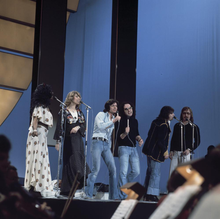Sing Sang Song
| Sing Sang Song | |
|---|---|
| Les Humphries Singers | |
| publication | April 12, 1976 |
| length | 3:02 |
| Genre (s) | Pop , Schlager |
| Author (s) | Ralph Siegel , Kurt Hertha |
| album | Sing Sang Song |
Sing Sang Song was the German contribution to the 1976 Eurovision Song Contest , which was sung by the Les Humphries Singers . On the stage in The Hague , however, was only part of the 16-member group, among them Jürgen Drews , John Lawton and David O'Brien as well as two singers; According to the regulations, a maximum of six singers were allowed on stage. Les Humphries conducted. For the first time, Ralph Siegel , who wrote the Luxembourg contribution in 1974 , wrote a song for Germany.
Music and lyrics
The pop song partly shows the typical set singing of the group, partly the male voices sing quite high and in two voices. The text essentially consists of the repeated title of the song, the remaining lines of text are a plea for global unity that should be created by singing this song.
Origin and reception
The song was written by Ralph Siegel with Kurt Hertha (text). According to some sources, Les Humphries and Jimmy Bilsbury were also involved in the composition. The single, which was released by Decca on April 12, 1976 , reached number 45 in Germany and was charted for one week. In retrospect, ARD described the title as "unimaginative and boring". It was the group's last chart-topping single, which broke up that same year.
Song contest
The song was only allowed to the song contest because Tony Marshall had previously been disqualified with his song Der Star , the winning title from the preliminary round "A Song for The Hague" - which had already been published in 1973 by Nizza Thobi . Sing Sang Song had reached second place in the preliminary round.
Sing Sang Song was listed third in the Song Contest (after the Swiss Peter, Sue & Marc with Djambo Djambo and before Chocolate Menta Mastik from Israel with Emor Shalom ). The conductor was Les Humphries. At the end of the vote, the song had received twelve points and finished 15th in a field of 18. The choreography did not offer any particular highlights. The reactions to the performance varied: some media wrote that “the concept of the internationally mixed group and its ' flower power zeitgeist'” had come to an end. According to an interview, the group itself enjoyed over 450 million viewers in 33 countries and the associated attention.
Individual evidence
- ↑ a b https://hitparade.ch/song/The-Les-Humphries-Singers/Sing-Sang-Song-28358
- ↑ a b https://www.eurovision.de/teilnehmer/Deutschland-The-Les-Humphries-Singers,leshumphries111.html
- ↑ https://www.youtube.com/watch?v=rINH2CzAmg0
| predecessor | Office | successor |
|---|---|---|
|
A song can be a bridge by Joy Fleming |
Germany at the Eurovision Song Contest 1976 |
Telegram from Silver Convention |

